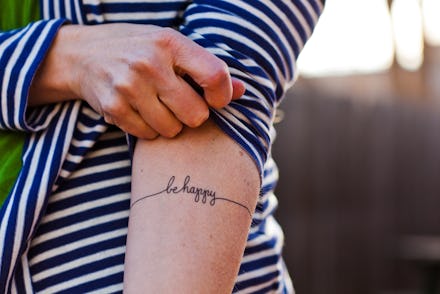Here's Why You Won't Regret Getting That Tattoo You've Been Wanting

If tattoos are art, then this might be the Renaissance. They are more popular than ever, which means more tattoo trends are emerging and catching young people's eyes. Any stigma once attached to those with tattoos is fading fast.
Seventy-five years ago, tattoos were associated with deviant behavior, from biker gangs to prisoners. That started to shift in the 1960s and 1970s and accelerate especially in the past 10 years. Now, about 20% of Americans have a tattoo.
Among millennials, that percentage is nearly 40%, according to the Pew Research Center. And we have lots of them: Half of tattooed millennials have two to five; 31% have one and 18% have more than five. We're also getting them younger, bigger and in more visible places, said tattoo artists interviewed by Mic, including Lalo Yunda and Michelle Myles.
As we rush to get tatted, with bigger and trendier ink than ever, you might think we're setting ourselves up for regret. But chances are, we're not. Here's why.
Tattoos are no longer job-stoppers: Certainly some people regret their tattoos, judging by tattoo removal numbers, which have jumped by 46% among millennials in the last couple of years, Time reported. But according to a 2012 poll, 86% of the people who have gotten tattoos don't regret their decision. Analysis by FiveThirtyEight also concluded that the number of young people who regret their tattoos is small.
That may be, in part, because those tattoos no longer pose serious professional obstacles. A 2011 survey by CareerBuilder.com found that tattoos ranked lower than "piercings" and "bad breath" as factors that could prevent you from being promoted.
The lessening stigma against tattoos, particularly in the workplace, is evidenced in changing tattoo trends. Ten to 15 years ago, most tats were on the forearm, chest or other easily covered areas, said Lalo Yunda, a tattoo artist living in New York City. It was only the hardcore enthusiasts who got inked in visible areas.
"Now, it's so common that you see this kid with a neck and a hand tattoo and their whole arm is clean," Yunda told Mic. "Before, getting a tattoo like that was definitely like a job-stopper."
Michelle Myles, a tattoo artist at Daredevil Tattoo in New York City, has seen the same shift.
"Generally, [professional] tattooers aren't comfortable with tattooing someone in such a visible location who isn't heavily tattooed," Myles told Mic. "But now it's this trend, and you have these people who have hardly any tattoos and are really young and have never lived with tattoos coming in wanting to get their first tattoo on their hands."
All those Instagram photos are actually good research: The trend for big, visible tattoos are also being inspired by social media and celebrities online. Rihanna solidified the "underboob" trend when she debuted a tattoo under her breasts, Yunda said. Riri's tatted hands and Cara Delevingne's intricate lion finger tattoo helped broaden the appeal of inked hands. Other bold trends include "watercolor" styles, with soft, blended colors, and geometric-style tats with sharp lines.
Yes, the existence of fleeting tattoo "trends" does contain a heaping dose of irony. But we've never been more equipped to make good judgments before jumping on a trend, said Myles. Social media and the Internet generally has armed us with more tools to research studios and artists prior to getting inked.
"If people really think it out and save their money and get a good job done and they research the artist, those people are very likely to be happy with the decision down the road," she said.
We may eventually stop relating, but that doesn't mean regretting: What avoiding "tattoo regret" may come down to is the difference between relating versus regretting. Years later, you might not be able to relate to that tattoo you got when you were in your teens, but that doesn't mean you regret it, Myles told Mic.
That beautiful distinction is on display in the short 2014 documentary, You Won't Regret That Tattoo, in which director Angie Bird explored the meaning tattoos held for an older generation — memories of loved ones, milestones in life, a spirit of rebellion.
Mostly, the tattoos represented who they were at that moment — which is increasingly the reason we're getting inked, experts say. In studies of recently tatted young people, the Atlantic reported, researchers found people "seemed to need proof that their identities existed at all." Our tattoos are us, at the time and years later.
"A tattoo — even a bad tattoo — is more than just an object or an image; it's a part of your body, and it's a memory," wrote Lindsay King-Miller for Cosmopolitan. "Your tattoo ages with the rest of you. Maybe it fades, or stretches, or sags, but so do other parts of you."
That's good news for the tattoo first-timers and those who are getting bigger and bolder designs. Even if today's tattoo trends are fleeting, there's always a different story behind each one. And better yet — there's a lifetime to keep on sharing those stories.